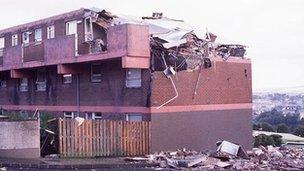Former officers challenge Derry bomb findings
- Published

Three people were murdered in the IRA attack
Retired RUC officers have cleared the first stage in a High Court challenge to watchdog claims that police did nothing to alert the public to an IRA bomb that killed three neighbours.
The claims were made in a Police Ombudsman's report.
Eugene Dalton, 54, and Sheila Lewis, 68, were killed in the explosion at a house in Londonderry.
A third victim, 57-year-old Gerard Curran, died months after being pulled from the rubble.
Proceedings were issued over an ombudsman probe into the booby-trap bombing in August 1988.
The report concluded there had been a failure by the police to protect the victims of the attack in the Creggan area of the city.
The Northern Ireland Retired Police Officers Association claims there was no legal power to make findings, which it claims contain inaccuracies.
Leave to seek a judicial review was granted on the basis that an arguable case has been established.
The attack became known as the "Good Samaritan bomb" because the three friends had gone to check on the whereabouts of a neighbour kidnapped earlier by the IRA.
The IRA later apologised, admitting it planted the booby trap device in a bid to kill soldiers.
Nearly two decades later, members of Mr Dalton's family lodged a complaint with the Police Ombudsman's Office that the RUC had been negligent and failed in its duty to uphold their father's right to life under Article Two of the European Convention on Human Rights.
Failure
In July last year, the Police Ombudsman, Dr Michael Maguire, published his findings that police officers had information about an IRA booby trap bomb in a house in the Creggan estate, but did nothing to warn residents of the possible danger.
He identified a failure in the police obligation to protect the lives of the public.
The report provoked a furious reaction within the association and a threatened boycott of ombudsman investigations into historical cases of alleged human rights breaches.
A legal challenge has now been initiated in a bid to have the findings quashed.
Papers lodged in the High Court claim the report contains a number of inaccuracies, failed to take into account relevant issues on intelligence at the time and denied the retired officers a chance to comment.
Lawyers for the association also contend that the ombudsman had legally overstepped the mark.
According to their case, he had no power to make findings in relation to Article Two of the European Convention on Human Rights.
A High Court judge granted leave to seek a judicial review on Wednesday after no contrary arguments were advanced at this stage.
The case will now proceed to a full two-day hearing in May when the ombudsman's legal representatives will defend the allegations.
Outside the court the association's solicitor, Dorcas Crawford, set out why the case was brought.
She said: "It's important to establish their rights as retired officers because they are being implicated and criticised without the right to reply."
- Published8 November 2013
- Published24 October 2013
- Published10 July 2013
- Published31 August 2011
- Published22 July 2010